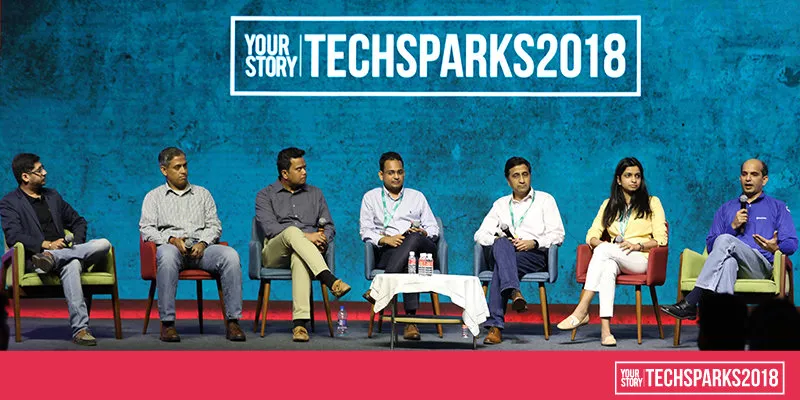How accelerators are helping startups ride in the fast lane

India has one of the busiest startup ecosystems in the world. As a result, accelerators and incubators are aplenty too.
A joint 2017 report by NASSCOM and Zinnov Consulting revealed that India ranks third in the world in the number of incubators and accelerators it has. Only China and the US have more than India’s 150-odd accelerators (primarily located in the startup hubs of Bengaluru, Mumbai, and Delhi-NCR).
How critical are these accelerators for the growth of startups? Are corporate accelerators better than private ones? What do startups really look for during their acceleration phase? What do accelerators gain out of their association with startups? And, most importantly, how do they measure success?
All this and more was spoken about at ‘The Fast Lane: Accelerating the Startup Ecosystem’ panel at TechSparks 2018.
Amey Mashelkar, Head, Jio GenNext, said, “Accelerator is a Western term. We have inherited it from them. Corporate accelerators are just a channel for startups to reach the end customer. They help you get to the right influencer for the value proposition you have to offer. In some cases, the transaction does not happen, but it is not the accelerator’s job to ensure that a transaction happens.”
“Startups come to us essentially looking for two things - early customer access and funding,” he added.
Sometimes, startups may even look at accelerators as initial customers, the panel opined. Saket Agarwal, Managing Partner, Onnivation, said, “Startups want the corporate accelerator to get them a great product fit. They also look at you as the first customer, and want you to pay for the pilot.”
How is a startup selected?
How does an accelerator decide which idea to back, and at what stage?
Ravi Kanniganti, Director & Head, Target Accelerator, explained,
“We select startups that can match the business case that serves Target’s overall purpose. We look at where Target needs to go, and we want startups to solve a real business problem, instead of just providing a superficial MVP. We mainly look to achieve growth and operational efficiencies through them.”
Target, Ravi said, pays for pilots. “But, we do not take any equity,” he added.
Like Target, Cisco (one of the leaders in startup acquisitions) too looks to solve problem areas. Krishna Sundaresan, VP of Engineering, Cisco, said,
“We consider how startup solutions can be integrated with our own products. We deal with only B2B startups that work in IoT and other niche technologies where we can actually help them take their product to the market. Or we can get them to create something for us. We are in this [acceleration] for the long haul and we want to build an ecosystem.”
Not all startups find an easy market fit though. Riya Aggarwal, CEO of BLS Accelerator, said, “Every startup is not meant for one market. We help startups scale up in other countries and develop partnerships through us.”
Contrarily, several international corporations run accelerators that are focused on India-specific investments. Qualcomm’s $150-million fund is one such.
Ajit Rao, Senior Director of Engineering, Qualcomm Ventures, said,
“We are actively investing out of our India fund. We are also very closely aligned with the government’s ‘Make in India’ vision. We give startups a worldwide scale and instant access to a very new market.”
Long-haul versus short-term
The panel was in agreement of the fact that corporate accelerators usually do not “disengage quickly” and most are in it for “long-term” benefits.
JioNext’s Amey said,
“Large corporates are more involved compared to private accelerators. That is an advantage. Reliance is all about scale. We back PoCs that can scale up. But, it is not an easy journey. It takes time. So far, we have worked with more than 100 startups, and 10-11 percent of them have entered into deep technical partnerships with us.”
Target too gets into “strategic” partnerships with startups. Ravi explained, “We cannot measure ROI on a yearly or a monthly basis. We have to see if the startups benefit from us. At the end of the pilot, are we adopting the product? That is what we call success. We may strategically invest in some of these startups.”
However, Target does not “take any exclusivity”, Ravi revealed. “If the startup can solve a problem for us, they can do for it other retailers too,” he said.
The long-term approach perhaps enables corporate accelerators to be more effective than private ones. Ravi said, “In India, the corporates have a better success rate than private accelerators. They will soon be churning out unicorns.”
BLS Accelerator’s Riya elaborated,
“This is because corporate accelerators already have large funds available. It is a strategic alliance for them. Private accelerators only look for returns, but corporates look for large-scale value addition. They are much more invested in the startups.”
Qualcomm, for instance, chooses to back only those startups that “can manufacture for” it. Ajit said,
“We are really looking to build synergies. We back those that can manufacture for us, and create large products. We are also looking at innovation as a key driver. We want to create an innovation culture.”
Path ahead for corporate accelerators
The panel reckoned a “co-creation” and “co-development” model is gaining ground, and will define the startup-accelerator equation going forward.
Target’s Ravi said,
“The cohort model has a fixed start and end time. But, now with more mature startups coming to the accelerator, co-development and co-creation will be the model ahead. These startups are not looking for funds. They want a business case, a real use case, and accelerators give them that.”
Furthermore, accelerator programmes are likely to become more specific. JioNext’s Amey observed, “The generic programmes will slow down, it will become more focused and sector-specific. And it will evolve towards a transaction. The challenge is to get more and more startups to go through it.”
“We should also look at SMEs and micro-SMEs,” he added.
Qualcomm’s Ajit said deep tech and automotive would be the hottest sectors in terms of accelerator interest.
“The deep tech space will get stronger in the years to come. I see a lot of VR/AR startups coming out of India. Automotive is another strong area.”
Interestingly, a lot of startups seem to be approaching more than one accelerator. And that, the panelists believed, will be the trend going ahead.
Target’s Ravi said, “Startups can learn something from one programme and go to another programme to solve other problems. It is a positive sign that startups are exploring different problems and verticals. Accelerators are a small community, and it helps if we are collaborating and creating an ecosystem.”








